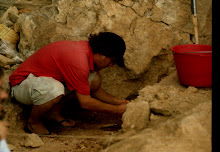"...most principal investigators (PI is what they call us) are frustrated, angry, worried people all the time during an excavation.I haven't read Jaynes' piece yet, though I'm now planning to stop by the newsstand on my way home and picking it up to see for myself. I'm of mixed mind after having read Hirst's post, though... While I agree with her that journalists will seize on the most dramatic aspects of archaeology to write about (in this case, field frustration), one has to wonder about whether it is ever a good idea to have a journalist on site for more than the time of a site tour and interview, and why? I assume that most archaeologists obviously want their project and research to gain as much public exposure as possible, and that often requires having journalists come visit a field site. However, it seems intuitive to me that having someone doing 'participant observation' on your project for a prolonged period of time will result in all aspects of your project getting more attention than they would have otherwise. On the other hand, many people say that any publicity is good publicity... mixed blessings, I guess.
But for the rest of the people on the crew, and any tourists or journalists who happen by, archaeology is incredibly dull. The work is painfully slow, the climate and dirt inescapable, the people tired and cranky. Any real exciting finds these days are very rare indeed and can take place under a microscope months or even years after the excavation is done.
It's clear what happened to Jaynes. He came into an important excavation and hung around, bored out of his skull. He eavesdropped on the only exciting thing going on: the frustration of a PI being expressed to his superior."
An Artificially Intelligent Pseudoarchaeologist?
6 months ago

No comments:
Post a Comment